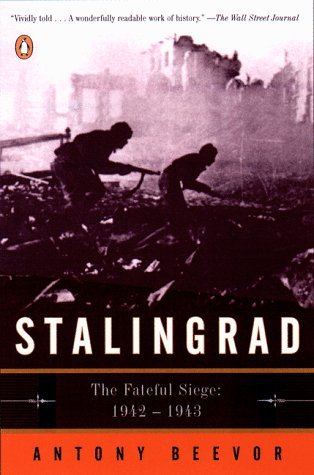More on this book
Community
Kindle Notes & Highlights
‘I am dying but do not surrender. Farewell Motherland. 20/VII—41’.
What is not mentioned is that several of the wounded Soviet soldiers captured in the citadel managed to survive Nazi prisoner-of-war camps until liberated in 1945. Instead of being treated as heroes, they were sent straight to the Gulag by SMERSH, following Stalin’s order that anyone who had fallen into enemy hands was a traitor.
‘Everywhere the Russians fight to the last man,’ he wrote in his diary. ‘They capitulate only occasionally.’
more commonly known as ‘Not One Step Backwards’. Stalin made many changes, then signed it. The order was to be read to all troops in the Red Army. ‘Panic-mongers and cowards must be destroyed on the spot. The retreat mentality must be decisively eliminated.
On one occasion in late September, when a group of Soviet soldiers surrendered, German tanks advanced rapidly to protect them from fire directed at them from their own lines.
This nineteen-year-old junior lieutenant had joined the regiment only five days before, and scarcely knew the two deserters from his platoon. ’The company commander obeyed the order. He went to his trench and, in the presence of the commissar, shot him dead.‘
‘Does this mean you will kill your own people?’ asked the Ruthenian. ‘What can we do?’ they answered. ‘If we run back to the Russians, we would be treated as traitors. And if we refuse to fight, we’ll be shot by the Germans.’
The sense of depriving the mighty German Army of its ill-gotten chattels was doubly pleasurable, but the old problems of semi-chronic alcoholism still arose. The commander, second-in-command and eighteen soldiers of a company on the southern flank became casualties from drinking a captured supply of German anti-freeze.
Sometimes when Russian and German recce groups passed each other at night in no man’s land, they pretended not to see each other.
Chuikov on his return, when very drunk, fell through a hole in the ice, and had to be fished out of the freezing water. The commander of the 62nd Army nearly met an ignominious and anti-climactic end.
Soviet divisions, on the other hand, suffered few restrictions on ammunition and alcohol. ‘Celebrating the New Year was good,’ wrote Viktor Barsov, in the marine infantry. ‘I drank 250 grams of vodka that night. The food wasn’t bad. In the morning to avoid a headache I drank 200 grams more.’
Dyatlenko and Smyslov then returned to front headquarters in the Willys staff car with the two generals, ‘sad and tired’ because their mission had been a failure and many men were to die for no purpose.
‘It was the end of all my illusions about Hitler. I was convinced that we would now lose the war.’
Regiments and divisions were utterly meaningless. The 14th Panzer Division had fewer than eighty men
A number of German soldiers, wrongly identified as SS, who laughed at the suggestion, were pushed to one side and executed with sub-machine-guns. Apparently Red Army soldiers from a Siberian division turned away in disgust from the spectacle.
Hitler kept coming back again and again to Paulus’s failure to commit suicide.
Chances of survival proved brutally dependent on rank. Over 95 per cent of soldiers and NCOs died, 55 per cent of junior officers and just 5 per cent of senior officers.


